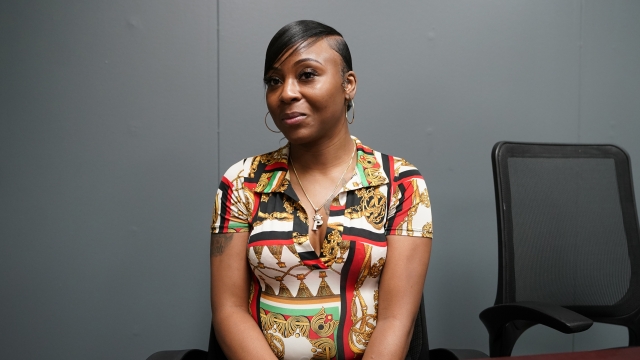A Detroit woman is suing the city and a police officer, saying she was falsely arrested when she was eight months pregnant and accused of a carjacking based on facial recognition technology that is now the target of lawsuits filed by three Black Michigan residents.
Porcha Woodruff, a 32-year-old Black woman, was preparing her two children for school on Feb. 16 when six Detroit police officers showed up at her house and presented her with an arrest warrant for robbery and carjacking, according to a lawsuit filed in U.S. District Court for the Eastern District of Michigan on Thursday.
"This case was shocking to me, to say the least," says attorney Ivan Land.
"My two children had to witness their mother being arrested," Woodruff said. "They stood there crying as I was brought away."
Woodruff's case was dismissed by the Wayne County Prosecutor's Office in March for insufficient evidence, according to the lawsuit.
The lawsuit says that Woodruff has suffered, among other things, "past and future emotional distress" because of the arrest. Woodruff said her pregnancy already had multiple complications that she worried the stress surrounding the arrest would further exacerbate.
"I could have lost my child," Woodruff said.
Woodruff was identified as a subject in a January robbery and carjacking through the Detroit Police Department’s facial recognition technology, according to a statement from the office of Wayne County Prosecutor Kym Worthy. Detroit detectives showed a photo lineup to the carjacking victim, who positively identified Woodruff.
"I believe if they would have ran that photo through, the current picture, Ms. Woodruff would not be sitting here today," Land said.
SEE MORE: Movement to ban facial recognition at venues picks up steam
The American Civil Liberties Union of Michigan is now calling on the Detroit Police Department to end the use of the facial recognition technology that led to Woodruff's arrest.
This is the third known allegation of a wrongful arrest by Detroit police based on the technology, according to the ACLU. Robert Williams, a Black man, who was arrested when facial recognition technology mistakenly identified him as a suspected shoplifter, sued Detroit police in 2021 seeking compensation and restrictions on how the city uses the tool.
Another Black man, Michael Oliver, sued the city in 2021, claiming that his false arrest because of the technology in 2019 led him to lose his job.
"They're not equipped to deal with facial recognition," says Land. "You just don't receive a hit and just send out the warrant even if the victim picks them out. You still go further with your investigation just to make sure you are arresting the correct person."
Critics say the technology results in a higher rate of misidentification of people of color than of White people. Woodruff's lawsuit contends that facial recognition has been "proven to misidentify Black citizens at a higher rate than others," and that "facial recognition alone cannot serve as probable cause for arrests."
"It's deeply concerning that the Detroit Police Department knows the devastating consequences of using flawed facial recognition technology as the basis for someone's arrest and continues to rely on it anyway," said Phil Mayor, senior staff attorney at ACLU of Michigan, in a statement.
The Wayne County prosecutor's office maintains that the arrest warrant was "appropriate based upon the facts."
The office says the case was dismissed "because the complainant did not appear in court."
"I needed to talk to him about were you coerced into picking photo lineup number two," says Land.
Detroit Police Chief James E. White said in a statement that the allegations contained in the lawsuit are "deeply concerning" and said the department is "taking this matter very seriously."
Additional investigation is needed, White said. Woodruff said she believes that how far along she was in her pregnancy helped how police treated her. She said she hopes her lawsuit will change how police use the technology to ensure "this doesn't happen again to someone else."
"Law enforcement agencies across the world use facial recognition and they don't have this problem," says Land.
This story was originally published by Joe Cappelletti and Kimberly Craig of Scripps News Detroit, and from the Associated Press.
SEE MORE: TSA testing facial recognition technology, prompting privacy concerns
Trending stories at Scrippsnews.com



